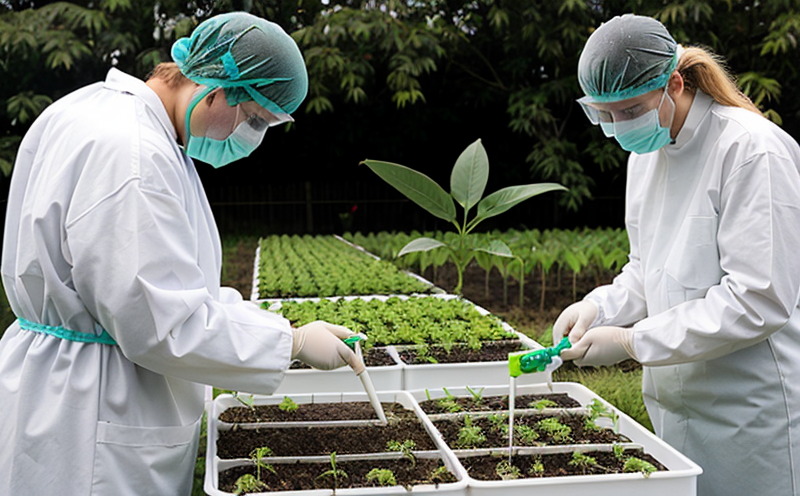Soil-Borne Pathogen Detection in Plants
The detection and identification of soil-borne pathogens is a critical component in ensuring plant health and agricultural productivity. Soilborne pathogens such as fungi, bacteria, and viruses can significantly impact crop yields, reduce quality, and lead to economic losses for farmers and horticulturists worldwide. Accurate and timely diagnosis of these pathogens helps in implementing effective management strategies that minimize their spread and mitigate potential risks.
Our laboratory provides comprehensive testing services specifically designed to identify soil-borne pathogens affecting plants. Using advanced microbiological techniques, molecular biology methods, and cutting-edge instrumentation, we can accurately detect a wide range of pathogens that are known to cause diseases in various crops including cereals, vegetables, fruits, and ornamental plants.
The first step in our testing process involves the collection of soil samples from fields or nurseries suspected of harboring pathogenic organisms. These samples are then processed according to standardized protocols (ISO 14693:2015) ensuring precision and reliability. Once prepared, the samples undergo multiple stages of analysis using various methodologies such as culture-based techniques, serological methods, and nucleic acid amplification tests like PCR.
Our laboratories utilize state-of-the-art equipment including fluorescence microscopes (Carl Zeiss Axio Observer), qPCR machines (Applied Biosystems 7500), and automated colony counters to ensure precise results. This approach allows us to provide rapid turnaround times while maintaining high standards of accuracy.
The importance of early detection cannot be overstated; once pathogens are identified, appropriate measures can be taken immediately to prevent further contamination or spread within the affected area. Knowledge about specific pathogen types present in soils also aids researchers in developing new varieties resistant to these threats and informs best practices for sustainable farming techniques.
By offering this service, our goal is not only to assist individual farmers but also contribute towards broader goals of improving global food security by promoting healthier crops through better understanding and control over soil-borne diseases.
Customer Impact and Satisfaction
The impact of our soil-borne pathogen detection services extends beyond just providing accurate test results; it encompasses a range of benefits that positively influence customer satisfaction across different sectors within agriculture. For quality managers, having reliable data on the presence or absence of harmful microorganisms in soil helps them make informed decisions regarding crop management practices and pest control strategies.
- Improved Crop Quality: By detecting pathogens early, farmers can implement targeted treatments before issues escalate, leading to higher-quality produce.
- Economic Savings: Preventative measures based on laboratory findings reduce the need for extensive chemical interventions later in the growing cycle, saving money and resources.
- Enhanced Reputation: Satisfied customers appreciate knowing that their products meet strict hygiene standards, which enhances brand reputation among consumers.
In summary, our service plays a crucial role in supporting sustainable agricultural practices by empowering stakeholders with knowledge necessary for optimal decision-making processes.
Environmental and Sustainability Contributions
- Promoting Sustainable Farming Practices: Early detection of soil-borne pathogens allows farmers to adopt integrated pest management approaches, reducing reliance on chemical pesticides and promoting environmentally friendly practices.
- Minimizing Agricultural Waste: With precise diagnostics, unnecessary treatments can be avoided, thereby decreasing waste generated from overapplication of chemicals or other inputs.
- Preserving Natural Resources: By minimizing the use of harmful substances in soil treatment, we help preserve natural resources and ecosystems around farmlands.
Our commitment to environmental stewardship is reflected through our adherence to stringent quality assurance procedures that ensure minimal impact on both local environments and global sustainability efforts.
Use Cases and Application Examples
| Case Study | Description of Pathogen | Type of Crop Affected |
|---|---|---|
| Corn Root Rot Detection | Fusarium species causing root rot in maize plants. | Maize (corn) |
| Brown Stem Rot Identification | Phoma terrestris responsible for brown stem rots in various grasses including wheat and barley. | Grasses such as wheat, barley, oats. |
| Root-knot Nematode Analysis | Meloidogyne javanica leading to stunted growth and yield reduction in vegetables like tomatoes. | Tomatoes, peppers, eggplants. |
In addition to these specific cases, our laboratory has also conducted extensive research on other common soil-borne pathogens affecting different types of plants. Our expertise covers a broad spectrum of agricultural crops and ornamental species ensuring comprehensive coverage for all clients' needs.





